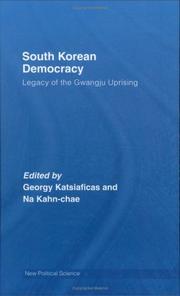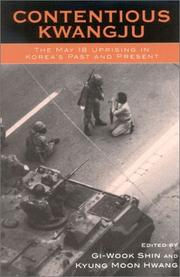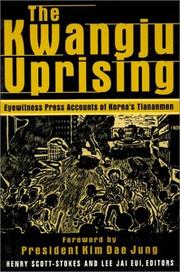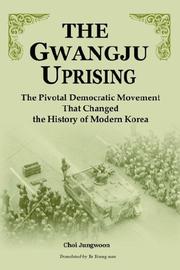| Listing 1 - 10 of 36 | << page >> |
Sort by
|
Book
ISBN: 9781565914957 1565914953 Year: 2020 Publisher: Carlsbad Hollym
Abstract | Keywords | Export | Availability | Bookmark
 Loading...
Loading...Choose an application
- Reference Manager
- EndNote
- RefWorks (Direct export to RefWorks)

ISBN: 0415407605 9780415407601 Year: 2006 Publisher: London Routledge
Abstract | Keywords | Export | Availability | Bookmark
 Loading...
Loading...Choose an application
- Reference Manager
- EndNote
- RefWorks (Direct export to RefWorks)
Democracy --- Kwangju Uprising, Kwangju-si, Korea, 1980 --- History
Book
ISBN: 9781788737142 Year: 2022 Publisher: London Verso
Abstract | Keywords | Export | Availability | Bookmark
 Loading...
Loading...Choose an application
- Reference Manager
- EndNote
- RefWorks (Direct export to RefWorks)
"An account of the movement for democracy and freedom in South Korea in the tumultuous period of the 1980s dictatorship"--
Kwangju Uprising, Kwangju-si, Korea, 1980 --- Democracy --- History --- Kwangju-si (Chŏlla-namdo, Korea) --- History.

ISBN: 1442210370 1283616882 9786613929334 058546670X 9780585466705 9781442210370 0742519619 9780742519619 0742519627 9780742519626 9781283616881 6613929336 Year: 2003 Publisher: Lanham, Md. Rowman & Littlefield Publishers
Abstract | Keywords | Export | Availability | Bookmark
 Loading...
Loading...Choose an application
- Reference Manager
- EndNote
- RefWorks (Direct export to RefWorks)
One of the largest political protests in contemporary Korean history, the May 1980 Kwangju Uprising still exerts a profound, often contested, influence in Korean society. Through a deft combination of personal reflections and academic analysis, Contentious Kwangju offers a comprehensive examination of the multiple, shifting meanings of this seminal event and explains how the memory of Kwangju has affected Korean life from politics to culture. In keeping with the book's title, the essays offer competing interpretations of the Kw
Kwangju Uprising, Kwangju-si, Korea, 1980. --- Kwangju Incident, Kwangju-si, Korea, 1980 --- Kwangju Uprising, Korea (South), 1980 --- Kwangju-si (Korea) --- History. --- Kwangju Uprising, Kwangju-si, Korea, 1980 --- K9180 --- K9244 --- K9300.80 --- Korea: History -- post World War II (1945- ) --- Korea: Geography and local history -- Chŏlla-namdo, Chŏnra-namdo -- Kwangju --- Korea: Social sciences -- social and cultural history -- modern period, postwar period (1945- )

ISBN: 0765606364 9780765606365 0765606372 9780765606372 Year: 2000 Publisher: New York Sharpe
Abstract | Keywords | Export | Availability | Bookmark
 Loading...
Loading...Choose an application
- Reference Manager
- EndNote
- RefWorks (Direct export to RefWorks)

ISBN: 1931907293 1931907366 9781931907293 9781931907361 Year: 2006 Publisher: Paramus Homa & Sekey Books
Abstract | Keywords | Export | Availability | Bookmark
 Loading...
Loading...Choose an application
- Reference Manager
- EndNote
- RefWorks (Direct export to RefWorks)
Book
ISBN: 9788956250595 Year: 2011 Publisher: 서울 도서출판 학고재
Abstract | Keywords | Export | Availability | Bookmark
 Loading...
Loading...Choose an application
- Reference Manager
- EndNote
- RefWorks (Direct export to RefWorks)
Injo, --- Korea --- Namhan Sansŏng (Kwangju-gun, Korea) --- History
Book
Abstract | Keywords | Export | Availability | Bookmark
 Loading...
Loading...Choose an application
- Reference Manager
- EndNote
- RefWorks (Direct export to RefWorks)
Book
ISBN: 0231536321 9780231536325 9780231161367 0231161360 Year: 2014 Publisher: New York
Abstract | Keywords | Export | Availability | Bookmark
 Loading...
Loading...Choose an application
- Reference Manager
- EndNote
- RefWorks (Direct export to RefWorks)
In South Korea, the contentious debate over relations with the North transcends traditional considerations of physical and economic security, and political activists play a critical role in shaping the discussion of these issues as they pursue the separate yet connected agendas of democracy, human rights, and unification. Providing international observers with a better understanding of policymakers' management of inter-Korean relations, Danielle L. Chubb traces the development of various policy disputes and perspectives from the 1970s through South Korea's democratic transition. Focusing on four case studies-the 1980 Kwangju uprising, the June 1987 uprising, the move toward democracy in the 1990s, and the decade of "progressive" government that began with the election of Kim Dae Jung in 1997-she tracks activists' complex views on reunification along with the rise and fall of more radical voices encouraging the adoption of a North Korean-style form of socialism. While these specific arguments have dissipated over the years, their vestiges can still be found in recent discussions over how to engage with North Korea and bring security and peace to the peninsula.Extending beyond the South Korean example, this examination shows how the historical trajectory of norms and beliefs can have a significant effect on a state's threat perception and security policy. It also reveals how political activists, in their role as discursive agents, play an important part in the creation of the norms and beliefs directing public debate over a state's approach to the ethical and practical demands of its foreign policy.
Korean reunification question (1945- ) --- Kwangju Uprising, Kwangju-si, Korea, 1980. --- Democratization --- Political aspects --- History --- Korea (South) --- Korea (North) --- Foreign relations --- Politics and government.
Book
ISBN: 9780231161367 Year: 2014 Publisher: New York Columbia university press
Abstract | Keywords | Export | Availability | Bookmark
 Loading...
Loading...Choose an application
- Reference Manager
- EndNote
- RefWorks (Direct export to RefWorks)
Democratization --- Korean reunification question (1945- ) --- Kwangju Uprising, Kwangju-si, Korea, 1980 --- History --- Political aspects --- Korea (North) --- Korea (South) --- Foreign relations --- Politics and government.
| Listing 1 - 10 of 36 | << page >> |
Sort by
|

 Search
Search Feedback
Feedback About UniCat
About UniCat  Help
Help News
News